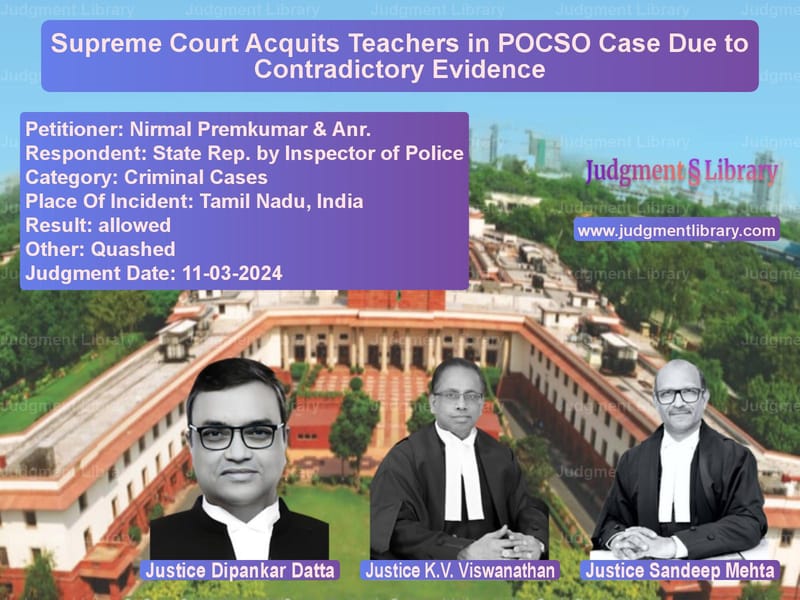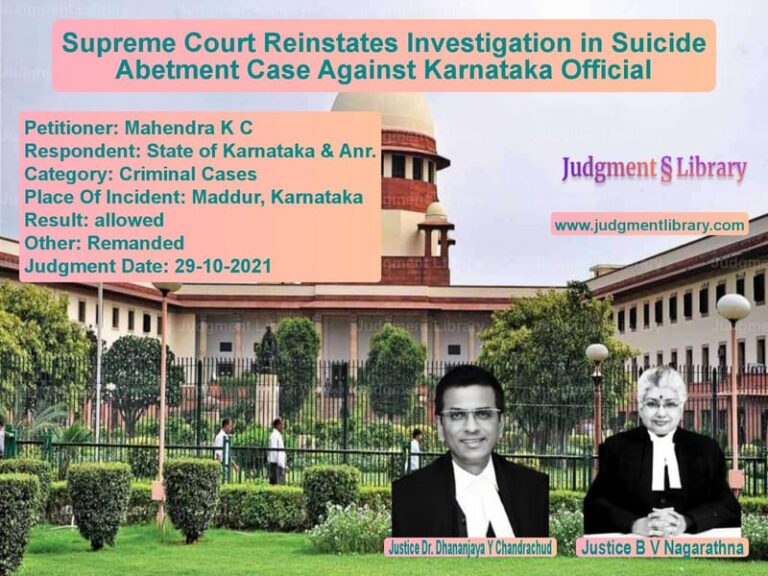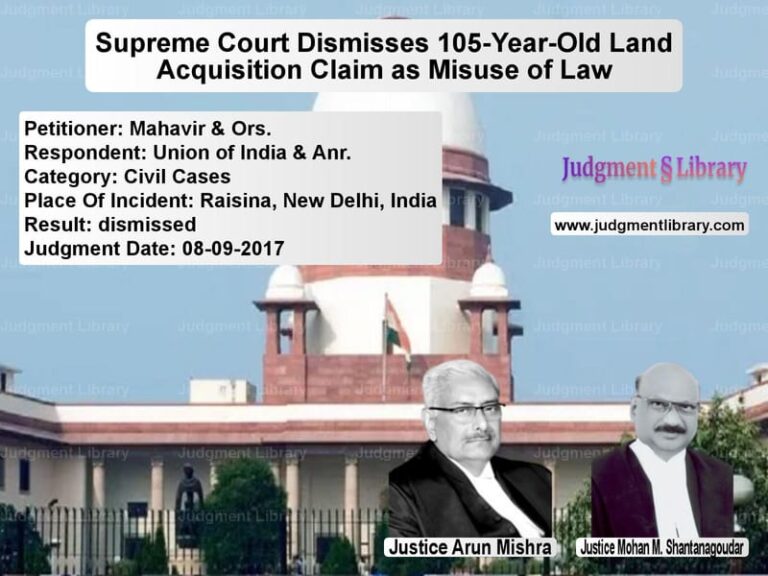Supreme Court Acquits Teachers in POCSO Case Due to Contradictory Evidence
The Supreme Court of India recently delivered a significant ruling in the case of Nirmal Premkumar & Anr. v. State Rep. by Inspector of Police, overturning the conviction of two school teachers under the Protection of Children from Sexual Offences Act (POCSO Act) and Section 506 of the Indian Penal Code (IPC). The Court held that the prosecution failed to prove the case beyond a reasonable doubt due to inconsistencies in witness testimonies.
Background of the Case
The case involved two school teachers, A-1 (Tamil teacher) and A-2 (Social Science teacher), accused of sexually harassing a 13-year-old girl student. The allegations revolved around three incidents:
- On February 14, 2018, A-1 allegedly forced the victim to accept flowers and chocolates in front of the class.
- Later that day, A-2 reportedly pressured the victim to talk to A-1, stating that A-1 would die if she refused.
- On February 15, 2018, A-1 allegedly summoned the victim to a room and told her that even if her family found out, they could do nothing.
The victim initially disclosed these incidents to her maternal aunt (P.W.4), who then informed the girl’s parents. The victim’s father (P.W.1) approached the school’s Headmaster (P.W.10), but no immediate action was taken. Dissatisfied, P.W.1 filed a complaint with the police on February 18, 2018.
Trial Court and High Court Rulings
The Special Court for POCSO cases convicted A-1 under Section 12 of the POCSO Act, sentencing him to three years’ rigorous imprisonment and a fine of Rs. 30,000. A-2 was convicted under Section 506 IPC (criminal intimidation) and sentenced to two years’ rigorous imprisonment with a fine of Rs. 20,000.
The High Court upheld these convictions, leading the accused to appeal to the Supreme Court.
Petitioners’ Arguments
The defense raised several key arguments:
- The prosecution failed to prove its case beyond a reasonable doubt.
- The victim’s testimony contained several contradictions and inconsistencies.
- There were no corroborating witnesses from the classroom, and the only classmate examined (P.W.6) turned hostile.
- The alleged incidents were reported late, with discrepancies in when and how the complaint was filed.
- The prosecution could not establish ‘sexual intent’ under the POCSO Act.
Respondents’ Arguments
The State of Tamil Nadu argued:
- The victim’s testimony was credible and required no corroboration.
- Teachers hold a position of trust, and their actions should be viewed seriously.
- The lack of eyewitness testimony did not negate the offense.
- The Special Court and High Court had correctly assessed the evidence.
Supreme Court’s Observations
The Supreme Court conducted a detailed review of the evidence and found serious inconsistencies in the prosecution’s case:
- Contradictions in the victim’s statements: The victim’s statement under Section 164 CrPC differed from her testimony in court regarding the physical force used by A-1.
- Lack of corroborating witnesses: Despite the alleged incident occurring in a full classroom, no student (except P.W.6, who turned hostile) supported the victim’s claims.
- Failure to prove sexual intent: The prosecution could not establish that A-1’s actions were committed with sexual intent, a crucial element under the POCSO Act.
- Delays and inconsistencies in reporting: The complaint was filed before the school’s internal inquiry could be completed, and different witnesses gave conflicting accounts of who reported the matter to the police.
- Misinterpretation by lower courts: The High Court mistakenly stated that A-1 pinched the victim, even though she never mentioned this in her testimony.
Key Judicial Remarks
The Supreme Court emphasized the importance of reliable testimony in sexual offense cases:
“The sole testimony of the victim, if found reliable and trustworthy, requires no corroboration. However, if inconsistencies exist, the court must look for corroboration.”
On the issue of burden of proof, the Court held:
“Conviction undoubtedly can be recorded on the sole evidence of a victim of crime; however, it must undergo a strict scrutiny through the well-settled legal principles as established by this Court in a catena of decisions.”
Final Judgment
The Supreme Court ruled:
- The convictions of A-1 under Section 12 of the POCSO Act and A-2 under Section 506 IPC were set aside.
- The accused were acquitted of all charges.
- The appellants were ordered to be released immediately if not wanted in any other case.
Conclusion
This judgment reinforces the principle that criminal convictions must be based on solid and unambiguous evidence. While protecting minors from sexual harassment is of utmost importance, the Court clarified that inconsistencies in testimony must not be overlooked. The ruling ensures that accusations under the POCSO Act undergo stringent judicial scrutiny, balancing the rights of victims and the accused.
Petitioner Name: Nirmal Premkumar & Anr..Respondent Name: State Rep. by Inspector of Police.Judgment By: Justice Dipankar Datta, Justice K.V. Viswanathan, Justice Sandeep Mehta.Place Of Incident: Tamil Nadu, India.Judgment Date: 11-03-2024.
Don’t miss out on the full details! Download the complete judgment in PDF format below and gain valuable insights instantly!
Download Judgment: nirmal-premkumar-&-a-vs-state-rep.-by-inspec-supreme-court-of-india-judgment-dated-11-03-2024.pdf
Directly Download Judgment: Directly download this Judgment
See all petitions in Juvenile Justice
See all petitions in Public Interest Litigation
See all petitions in Legal Malpractice
See all petitions in Judgment by Dipankar Datta
See all petitions in Judgment by K.V. Viswanathan
See all petitions in Judgment by Sandeep Mehta
See all petitions in allowed
See all petitions in Quashed
See all petitions in supreme court of India judgments March 2024
See all petitions in 2024 judgments
See all posts in Criminal Cases Category
See all allowed petitions in Criminal Cases Category
See all Dismissed petitions in Criminal Cases Category
See all partially allowed petitions in Criminal Cases Category







